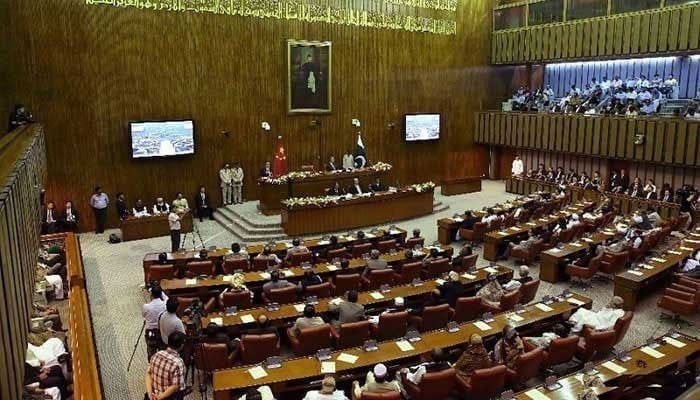Increasing retirement age of judges: Govt shy of three votes in Senate to amend Constitution
Source confided that govt and treasury benches are just short of three votes in Senate to amend Constitution for an increase in retirement age of judges of superior judiciary
ISLAMABAD: The retirement age of superior court judges will be increased through a constitutional amendment as soon as the government secures a 2/3rd majority in the National Assembly and Senate, said a government source.
The source confided that the government and treasury benches are just short of three votes in the Senate to amend the Constitution for an increase in the retirement age of judges of superior judiciary.
Information Minister Attaullah Tarar, however, when approached, did not offer any comment. Neither did he confirm nor denied. When pressed he said that he would contact the law minister and get back. But he did not get back till the filing of this report.
The source, however, on condition of not being named, said the government has already managed a 2/3rd majority in the National Assembly. “We are short of only three votes in the Senate,” the source said, adding, “We are expecting to get the magic number any time and as soon as it is achieved, the constitutional amendment will be introduced and passed by parliament.”
The Article 179 of the Constitution envisages that a judge of the Supreme Court shall hold office until he attains the age of sixty-five years unless he sooner resigns or is removed from office under the Constitution. Article 195 of the Constitution says that a judge of a High Court shall hold office until he attains the age of sixty-two years unless he sooner resigns or is removed from office following the Constitution. The government intends to increase the retirement age of SC judges to 68. In the case of high court judges, the retirement age will be increased to 65. This would be possible only through a constitutional amendment.
A few months back, Law Minister Azam Nazir Tarar had told the media that across-the-board increase in retirement age, including that of judges, was being considered by the government. On May 7, a newspaper reported Information Minister Attaullah Tara as dismissing the notion that a proposed extension in the retirement age was to favour “one particular institution”, adding that the move would be implemented across the board, if approved. Whereas Law Minister Azam Tarar was quoted as saying, “I will not vehemently turn down the proposals related to the tenure of chief justice.”
Later, the government has been repeatedly denying that there was any proposal under consideration for an extension in the tenure of Chief Justice, who also said that he would not accept any extension.
A press release issued by the Supreme Court on Tuesday, to clarify speculation relating to the incumbent Chief Justice’s recent off-the-record conversation with reporters, said, “The chief justice was asked about the extension of his tenure, to which he replied that several months earlier the law minister had come to him in his chamber and stated that the government was considering fixing the tenure of Chief Justice of Pakistan for three years.
“The Chief Justice informed the journalists that he told the law minister that if the proposal was individual-specific and, if enacted, it would not be something he would accept,” says the press release adding that the senior puisne judge and attorney-general were present.
-
 'The Muppet Show' Star Miss Piggy Gives Fans THIS Advice
'The Muppet Show' Star Miss Piggy Gives Fans THIS Advice -
 Sarah Ferguson Concerned For Princess Eugenie, Beatrice Amid Epstein Scandal
Sarah Ferguson Concerned For Princess Eugenie, Beatrice Amid Epstein Scandal -
 Uber Enters Seven New European Markets In Major Food-delivery Expansion
Uber Enters Seven New European Markets In Major Food-delivery Expansion -
 Hollywood Fights Back Against Super-realistic AI Video Tool
Hollywood Fights Back Against Super-realistic AI Video Tool -
 Meghan Markle's Father Shares Fresh Health Update
Meghan Markle's Father Shares Fresh Health Update -
 Pentagon Threatens To Cut Ties With Anthropic Over AI Safeguards Dispute
Pentagon Threatens To Cut Ties With Anthropic Over AI Safeguards Dispute -
 Samsung Galaxy Unpacked 2026: What To Expect On February 25
Samsung Galaxy Unpacked 2026: What To Expect On February 25 -
 Travis Kelce Takes Hilarious Jab At Taylor Swift In Valentine’s Day Post
Travis Kelce Takes Hilarious Jab At Taylor Swift In Valentine’s Day Post -
 NASA Confirms Arrival Of SpaceX Crew-12 Astronauts At The International Space Station
NASA Confirms Arrival Of SpaceX Crew-12 Astronauts At The International Space Station -
 Can AI Bully Humans? Bot Publicly Criticises Engineer After Code Rejection
Can AI Bully Humans? Bot Publicly Criticises Engineer After Code Rejection -
 Search For Savannah Guthrie’s Abducted Mom Enters Unthinkable Phase
Search For Savannah Guthrie’s Abducted Mom Enters Unthinkable Phase -
 Imagine Dragons Star, Dan Reynolds Recalls 'frustrating' Diagnosis
Imagine Dragons Star, Dan Reynolds Recalls 'frustrating' Diagnosis -
 Steve Jobs Once Called Google Over Single Shade Of Yellow: Here’s Why
Steve Jobs Once Called Google Over Single Shade Of Yellow: Here’s Why -
 Barack Obama Addresses UFO Mystery: Aliens Are ‘real’ But Debunks Area 51 Conspiracy Theories
Barack Obama Addresses UFO Mystery: Aliens Are ‘real’ But Debunks Area 51 Conspiracy Theories -
 Selma Blair Explains Why Multiple Sclerosis 'isn't So Scary'
Selma Blair Explains Why Multiple Sclerosis 'isn't So Scary' -
 Will Smith Surprises Wife Jada Pinkett With Unusual Gift On Valentine's Day
Will Smith Surprises Wife Jada Pinkett With Unusual Gift On Valentine's Day




